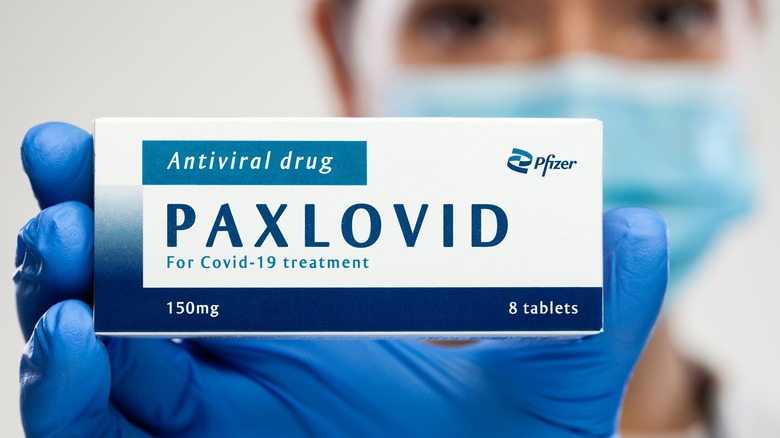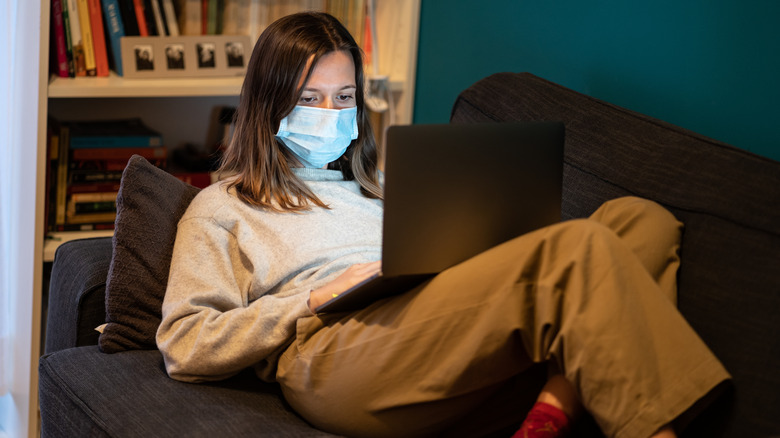COVID-19 Is Recurring In People Who Took Pfizer's Antiviral & Doctors Don't Know Why
Since the U.S. Food and Drug Administration (FDA) approved Paxlovid as a valid treatment for COVID-19 in December 2021, many people saw the benefits of using it. Many people report feeling better during the five-day course of treatment and, for a large group of people, that treatment is enough for them to be COVID-free. However, more and more cases of coronavirus rebound are cropping up in patients who completed their Paxlovid course successfully, only to see the virus come right back with symptoms when the treatment is over. As reported by NBC News, anecdotal reports of people who get sick again after taking Paxlovid are coming up every so often. This brings up some important questions: are those rebound patients safe to go out in public? Are they still infectious? Are they in any danger of hospitalization or seeing their symptoms worsen? Does this mean that Paxlovid is ineffective if it only suppresses the symptoms of the coronavirus during the treatment and not beyond?
In general, Paxlovid treatment has proven to be effective. In a clinical trial run by Pfizer between July and December 2021, unvaccinated patients treated with Paxlovid were 89% less likely to see their coronavirus infection develop into the serious stages that could lead to death. However, with some patients not only experiencing a return of their COVID-19 symptoms but also testing positive once more, some firm guidance is needed as to what to do with those cases. As of right now, there are no specific guidelines for rebound cases.
Rebound patients don't know where to turn to
NBC News described several cases of Paxlovid-treated patients developing coronavirus rebound infections in people ranging from a fully vaccinated and boosted 31-year-old to a 71-year-old man. In the case of the 31-year-old software engineer, Michael Henry, the patient found that when his COVID symptoms came back, he didn't know where to turn to. Every line of communication, including his doctor, his local COVID information line, and a health insurance nurse, provided him with different answers. This highlights how important it is for the CDC and/or the FDA to set up official guidelines in case these rebound cases continue to come up.
Dr. Michael Charness, the chief of staff at the VA Boston Healthcare System, detailed the case of one of his patients: a fully vaccinated and boosted 71-year-old man. The patient started taking Paxlovid from the day his symptoms started. The symptoms all but disappeared two days later and left him feeling good for a week, but once the course of medication ended, the man got sick again — this time for four days. According to testing, the man didn't develop a resistance to Paxlovid and he was not re-infected; it was the same coronavirus infection, re-emerging after the treatment had been completed.
New guidelines would be helpful
As for now, neither Pfizer nor the CDC has presented any official guidelines on what to do with rebound cases of COVID. The reasons behind these cases are also still a subject of speculation. According to NBC News, Dr. Charness speculates that Paxlovid suppresses the symptoms of the coronavirus so well that the system's immune response is compromised. On the other hand, Dr. Timothy Brewer from the University of California believes that the coronavirus may be found in parts of the body that Paxlovid is unable to access, such as the blood-brain barrier. Once the treatment is ended, these remnants of the virus continue making the patient sick for a few more days before going away. Brewer also suggests that not everyone's absorption of Paxlovid will be as effective as expected, meaning that they just don't receive enough of the drug in order to be rid of the virus.
In those cases, using a longer treatment of Paxlovid could potentially be enough to finish the remaining virus cells. However, as it's not yet fully FDA-approved, doctors are unable to prescribe more Paxlovid at their own discretion. It seems that until this is addressed, the patients who experience rebound COVID may be stuck in limbo with little to no answers. At least the CDC has a COVID-19 quarantine calculator to help people determine how much longer they need to isolate.


